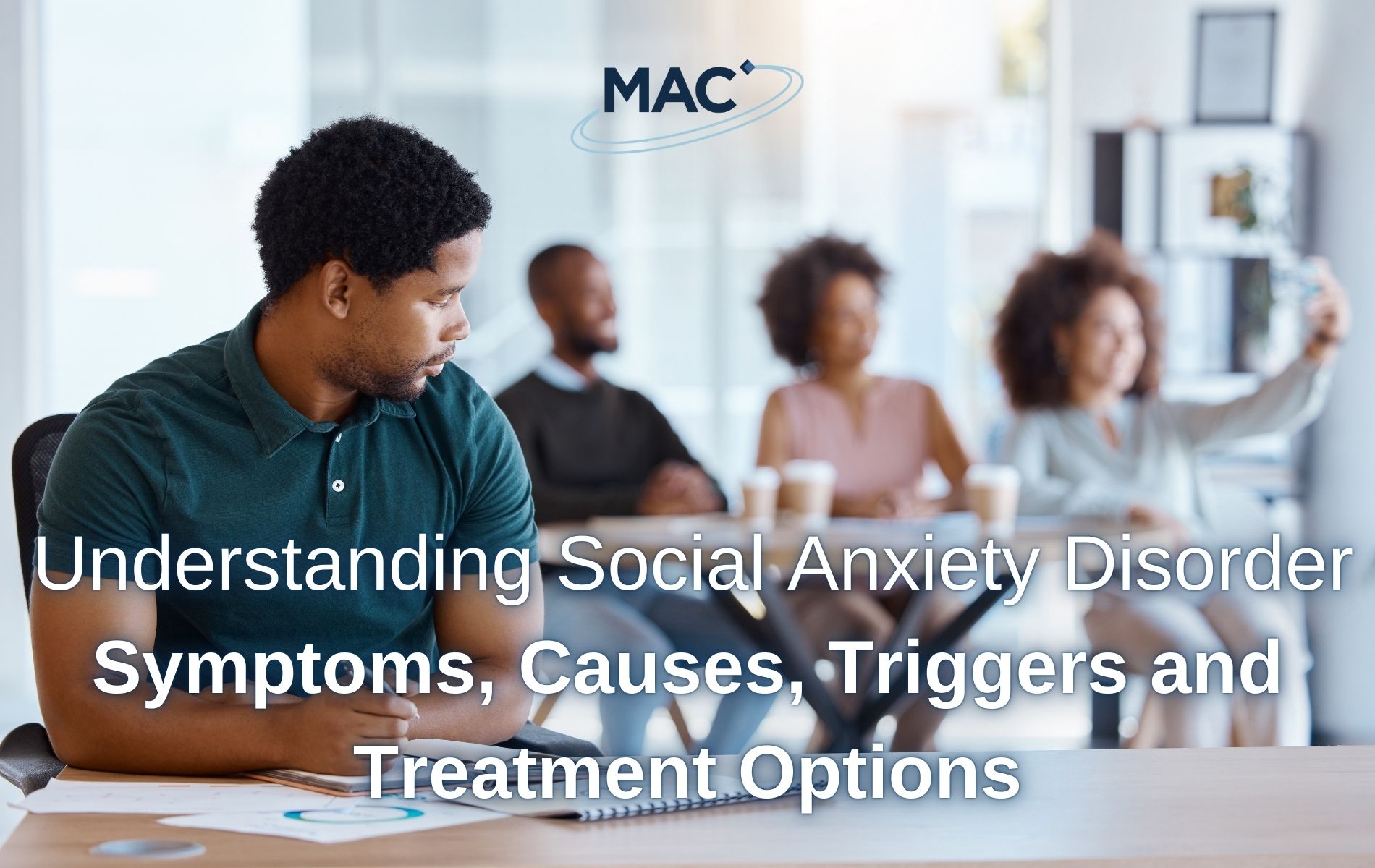Social Anxiety Disorder also known as social phobia, is more than just being shy; social anxiety is an intense fear of social situations that could impact day to day life. The fear caused by social anxiety can be overwhelming, and without proper treatment, could last years or even a lifetime. In this blog, we’ll introduce what social anxiety is, its causes, symptoms, and the treatment options that can help individuals regain confidence and take control of their lives.
What is social anxiety?
Social anxiety disorder is a long-term and overwhelming fear of social situations where individuals feel they might be judged, embarrassed, or humiliated. This intense fear often first appears during adolescence and has an impact on daily activities such as going to school, attending work, and other social interactions.
Common symptoms of social anxiety disorder include excessive worry towards social activities, having anxious feelings about daily social activities, fear of being criticised, or having low self-esteem. Other physical symptoms might include sweating, trembling, rapid heartbeat, or even panic attacks.
Social anxiety disorder is a common type of anxiety disorder; it is more common in women than in men, and without treatment, social anxiety disorder could last years, or even a lifetime1.
What causes social anxiety, and what are the triggers?
There are several potential causes for social anxiety disorder, including genetics, experiences, use of medications, and other health conditions.
Risk of developing social anxiety disorder is thought to run within families; however, there is currently no clear explanation on why some family members could have an anxiety disorder and others do not2. Whether the link is inherited through genetics or by learned behaviours still needs to be clarified.
Having a history of traumatic or upsetting experiences, such as bullying, being publicly embarrassed or humiliated, or other negative events involving interaction with others, can cause social anxiety disorder3.
Certain substances, such as alcohol, have been linked to the development of social anxiety disorder as well. Having a long-term painful health condition or disability could also make it more likely for someone to develop social anxiety disorder. For instance, a physical disability, a facial difference, speech impairment, or a neurodivergence, such as autism3.
Causes of social anxiety disorder can also be due to issues with the brain and nervous system. Elements such as a hyperactive nervous system, decreased amounts of serotonin, or increased sensitivity in areas of the brain that control mood and emotion could all be linked to the development of social anxiety disorder4.
It is likely that individuals have different triggers towards their social anxiety disorder; it might be daily social interactions, such as going to school or attending work in an office space, and some individuals may be able to cope with daily activities but have social anxiety towards performances, such as giving a speech, competing in a sports game, or playing a musical instrument on stage2.
Treatment options for social anxiety disorder
Depending on the severity, social anxiety disorder can be treated with therapy or medication.
Cognitive behavioural therapy (CBT) is a type of psychotherapy. During CBT sessions, therapists help people better understand their social anxiety triggers and learn coping strategies. The goal of CBT is to challenge negative thoughts and find mechanisms to overcome them.
Other treatments, such as guided self-help and applied relaxation, could also help social anxiety disorder without medication.
CBT is generally considered the best treatment, but other treatments may help if it does not work or if you prefer another method. Some people may find it more helpful to try a combination of treatments1.
Doctors may prescribe medications alone or alongside CBT to treat social anxiety disorder. Antidepressants are commonly used, even in those without depression, to alleviate anxiety symptoms. The two main antidepressants prescribed for anxiety are:
- selective serotonin reuptake inhibitors (SSRIs), such as paroxetine (Paxil) and sertraline (Zoloft)
- serotonin-norepinephrine reuptake inhibitors (SNRIs), such as venlafaxine (Effexor).
If you experience performance anxiety, your doctor may prescribe an anti-anxiety medication to use on an as-needed basis, such as before you give a presentation. These include:
- beta blockers such as propranolol (Inderal)
- benzodiazepines such as clonazepam (Klonopin) and lorazepam (Ativan).
These medications provide short-term relief by slowing your heart rate and calming the nervous system and can be taken as needed before an anxiety-producing situation.
Experiencing social anxiety and looking for new treatments?
More than one in ten of us could develop social anxiety disorder across our lifetime. MAC Clinical Research is currently seeking volunteers who have symptoms of social anxiety/social phobia and would like to take part in a new clinical trial to evaluate the effectiveness of an investigational medication with the potential to treat symptoms of social anxiety disorder.
For more information, please visit our Social Anxiety Disorder webpage.
References:
1.NHS – Social Anxiety Disorder (Social Phobia)
2.National Institute of Mental Health – Social Anxiety Disorder: More Than Just Shyness
3. Mental Health UK – Causes of social anxiety disorder
4. Harvard health – Social Anxiety Disorder: Treatments and Tips for managing this challenging situation




